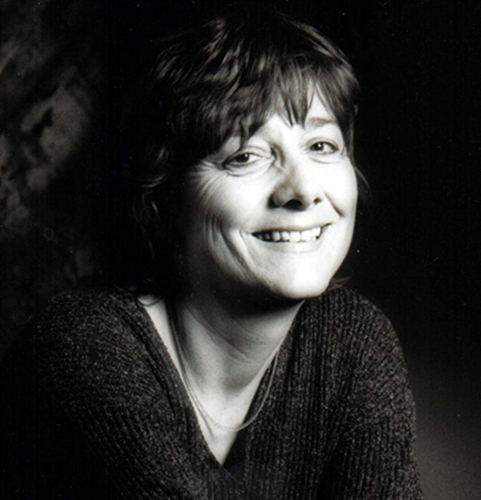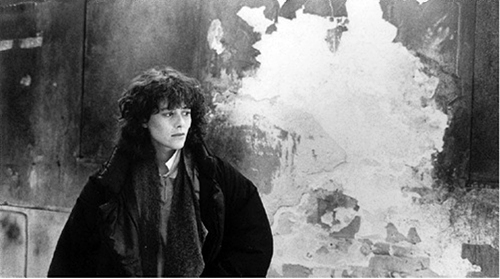5th(2003)
Anne Trister
Léa Pool
- Canada
- 1986
- 103min
- Beta
- color
SYNOPSIS
A Woman in Transit, which depicted three women on the verge of drastic change, ends without closure. Estelle starts her trip again, and the actress is awaiting Andrea’s next creative choice. Anne Trister, though not a sequel, starts at the very point where
A Woman in Transit ends. This film shows Anne’s journey; Anne who entered the new world, and finds her identity through her relationship with another woman.
Anne starts her trip after the death of her father. She leaves behind her native Switzerland, as well as the memories of her father and boyfriend, to settle down in Montreal. She falls in love with Alix, a psychiatrist. Alix takes the place of Anne’s mother; a mother that she feels she never had. Alix gives Anne a place to stay, and counsels her by encouraging her creativity. This process of recovering the bond with her ‘lost’ mother doubles as the process of finding her own identity. Acting as the reflective mirror is Alix’s relationship with Sarah.
In this film, Montreal is not an unknown place anymore. As opposed to Pool’s previous films where the characters could not settle down, this time the city becomes a more realistic space where the character’s dreams are challenged or destroyed. Anne, unable to paint in Switzerland, comes to have her own studio in Montreal. Images drawn on the empty studio wall show that she will struggle to write her own history in relation to her mother. Will it be a success or not? (Nam In-young)
A Woman in Transit ends. This film shows Anne’s journey; Anne who entered the new world, and finds her identity through her relationship with another woman.
Anne starts her trip after the death of her father. She leaves behind her native Switzerland, as well as the memories of her father and boyfriend, to settle down in Montreal. She falls in love with Alix, a psychiatrist. Alix takes the place of Anne’s mother; a mother that she feels she never had. Alix gives Anne a place to stay, and counsels her by encouraging her creativity. This process of recovering the bond with her ‘lost’ mother doubles as the process of finding her own identity. Acting as the reflective mirror is Alix’s relationship with Sarah.
In this film, Montreal is not an unknown place anymore. As opposed to Pool’s previous films where the characters could not settle down, this time the city becomes a more realistic space where the character’s dreams are challenged or destroyed. Anne, unable to paint in Switzerland, comes to have her own studio in Montreal. Images drawn on the empty studio wall show that she will struggle to write her own history in relation to her mother. Will it be a success or not? (Nam In-young)
PROGRAM NOTE
A Woman in Transit, which depicted three women on the verge of drastic change, ends without closure. Estelle starts her trip again, and the actress is awaiting Andrea’s next creative choice. Anne Trister, though not a sequel, starts at the very point where
A Woman in Transit ends. This film shows Anne’s journey; Anne who entered the new world, and finds her identity through her relationship with another woman.
Anne starts her trip after the death of her father. She leaves behind her native Switzerland, as well as the memories of her father and boyfriend, to settle down in Montreal. She falls in love with Alix, a psychiatrist. Alix takes the place of Anne’s mother; a mother that she feels she never had. Alix gives Anne a place to stay, and counsels her by encouraging her creativity. This process of recovering the bond with her ‘lost’ mother doubles as the process of finding her own identity. Acting as the reflective mirror is Alix’s relationship with Sarah.
In this film, Montreal is not an unknown place anymore. As opposed to Pool’s previous films where the characters could not settle down, this time the city becomes a more realistic space where the character’s dreams are challenged or destroyed. Anne, unable to paint in Switzerland, comes to have her own studio in Montreal. Images drawn on the empty studio wall show that she will struggle to write her own history in relation to her mother. Will it be a success or not? (Nam In-young)
A Woman in Transit ends. This film shows Anne’s journey; Anne who entered the new world, and finds her identity through her relationship with another woman.
Anne starts her trip after the death of her father. She leaves behind her native Switzerland, as well as the memories of her father and boyfriend, to settle down in Montreal. She falls in love with Alix, a psychiatrist. Alix takes the place of Anne’s mother; a mother that she feels she never had. Alix gives Anne a place to stay, and counsels her by encouraging her creativity. This process of recovering the bond with her ‘lost’ mother doubles as the process of finding her own identity. Acting as the reflective mirror is Alix’s relationship with Sarah.
In this film, Montreal is not an unknown place anymore. As opposed to Pool’s previous films where the characters could not settle down, this time the city becomes a more realistic space where the character’s dreams are challenged or destroyed. Anne, unable to paint in Switzerland, comes to have her own studio in Montreal. Images drawn on the empty studio wall show that she will struggle to write her own history in relation to her mother. Will it be a success or not? (Nam In-young)
Director
-

Léa PoolLéa Pool
설명 준비중입니다.
Credit
- ProducerClaude Bonin, Roger Frappier
- Cast Albane Guilhe, Louise Marleau, Lucie Laurier
- Screenwriter Léa Pool, Marcel Beaulieu
- Cinematography Pierre Mignot
- Editor Michel Arcand
- Music René Dupéré
- Sound Richard Besse




